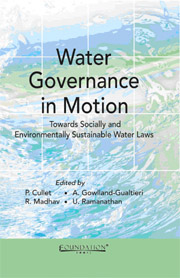Book contents
- Frontmatter
- Contents
- Acknowledgments
- Contributor Biographies
- Introduction
- I Water Law, Policy and Institutional Reforms in India
- II Ongoing Irrigation and Ground Water Reforms in India
- 5 Canal Irrigation, Water User Associations and Law in India – Emerging Trends in Rights-Based Perspective
- 6 Customary Rights and their Relevance in Modern Tank Management: Selected Cases in Tamil Nadu
- 7 Ground Water – Legal Aspects of the Plachimada Dispute
- III Perspectives on Privatisation
- IV Environment and Human Rights
- V Comparative Perspectives on Reforms
- Bibliography
6 - Customary Rights and their Relevance in Modern Tank Management: Selected Cases in Tamil Nadu
from II - Ongoing Irrigation and Ground Water Reforms in India
Published online by Cambridge University Press: 26 October 2011
- Frontmatter
- Contents
- Acknowledgments
- Contributor Biographies
- Introduction
- I Water Law, Policy and Institutional Reforms in India
- II Ongoing Irrigation and Ground Water Reforms in India
- 5 Canal Irrigation, Water User Associations and Law in India – Emerging Trends in Rights-Based Perspective
- 6 Customary Rights and their Relevance in Modern Tank Management: Selected Cases in Tamil Nadu
- 7 Ground Water – Legal Aspects of the Plachimada Dispute
- III Perspectives on Privatisation
- IV Environment and Human Rights
- V Comparative Perspectives on Reforms
- Bibliography
Summary
Introduction
In India, the use of natural resources and their associated technologies and laws have their origin in a base of traditional jurisprudence. The governance of important natural resources such as village water resources was decentralised, having its legal basis almost entirely in custom. A custom is law not written but established by long usage and consent of our ancestors. In a legal sense, a custom means a long-established practice considered as an unwritten law. In another sense, a custom depicts a long practice or usage having the force of law. Customs mostly take the place of law and regulate the conduct of men in the most important concerns of life. At times, customs die away or are abolished or suspended by statutory law. Nevertheless, customs have been a source of law independent from known sources, namely religious or ethical doctrine, texts or royal decrees, as far as traditional Indian jurisprudence is concerned. We can observe that many of these customary practices are even now in vogue in land-holding patterns, traditional water technologies, forest use, agriculture and fisheries. The legal frameworks based on customs provide a wealth of information on sustainable resource use and management.
Food security plays a crucial role in addressing the needs of a growing population and it is inextricably linked to poverty alleviation. Water is a crucial input for enhancing crop production and providing food security.
- Type
- Chapter
- Information
- Water Governance in MotionTowards Socially and Environmentally Sustainable Water Laws, pp. 129 - 158Publisher: Foundation BooksPrint publication year: 2010
- 2
- Cited by

